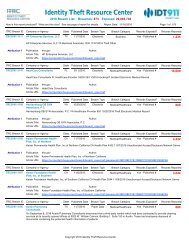You also want an ePaper? Increase the reach of your titles
YUMPU automatically turns print PDFs into web optimized ePapers that Google loves.
• Performance optimizations (DNS prefetching, Asynchronous OCSP checking, IP<br />
coalescence, etc)<br />
• Automatic Web Page translation<br />
• Multi-Platform support (Windows, Mac OS, Linux, Android, iOS, Chrome OS)<br />
Chrome implemented support for h2 in version 40 (March 2015), and since then it<br />
added a few things that make this browser very useful for debugging h2. Some of<br />
those features are explained below.<br />
<strong>HTTP</strong>/2 support (and how to disable it)<br />
Any Chrome versions newer than 41 or so have <strong>HTTP</strong>/2 enabled by default. <strong>HTTP</strong>/2<br />
will be automatically negotiated for Websites that announce <strong>HTTP</strong>/2 during the certificate<br />
negotiation, and where the required ciphers, and TLS negotiation protocols<br />
are available.<br />
<strong>HTTP</strong>S is required as Chrome does not negotiate h2c (<strong>HTTP</strong>/2<br />
over Cleartext, also known as non-TLS <strong>HTTP</strong>/2)<br />
You can start Chrome with the command line parameter “--use-http2=off ” to disable<br />
for support for the <strong>HTTP</strong>/2 protocol, which is very useful for comparing the performance<br />
of a Website with h2 on and off.<br />
Webpagetest.org<br />
The same command line parameter can be used with Webpagetest.org<br />
to run a performance test on a Chrome agent with <strong>HTTP</strong>/2<br />
on or off, and in this way compare the performance h2 brings. See<br />
https://community.akamai.com/community/web-performance/blog/<br />
2016/06/22/disabling-http2-on-webpagetestorg for more details.<br />
Handling of <strong>HTTP</strong>/2 (and how it differs from <strong>HTTP</strong>/1.1)<br />
End users may not notice any major differences when loading a Web page over<br />
<strong>HTTP</strong>/1.1 vs. <strong>HTTP</strong>/2 (other than most likely the page will load a little faster using<br />
the newer version of the protocol). However on the browser’s internals, there are<br />
many differences in the version 2 of the <strong>HTTP</strong> protocol (binary frame, stream multiplexing,<br />
header compression, server-push, etc.), which change the way the browser<br />
processes a page when it is delivered over <strong>HTTP</strong>/2.<br />
Google Chrome | 49





